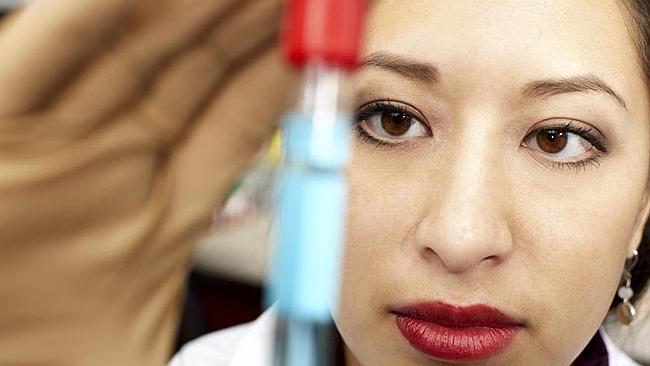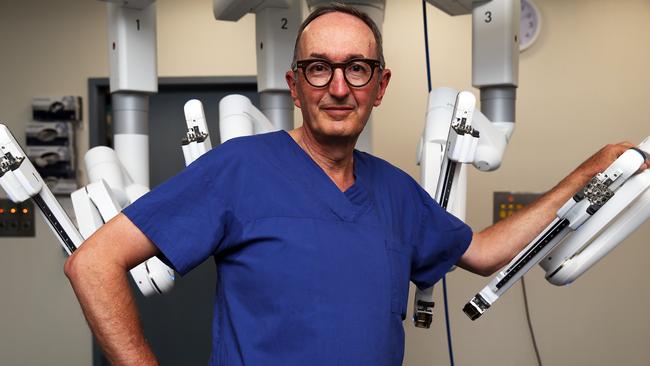Prostate cancer bungle: Questions remain over testing
TWO State Government pathology blunders in a week involving prostate cancer screening have sparked debate on the value of testing, health writer Katrina Stokes reports.

SA News
Don't miss out on the headlines from SA News. Followed categories will be added to My News.
- SA Pathology’s second big error in one week
- How the Sunday Mail broke the first story: Cancer blunder like being on ‘death row’
- SA Pathology boss sacked over cancer blunder revelations
- Clinic inundated as fears patients given false hope
- Clinicians sacked for spying on patient records
THEY’RE the words thousands of male Australians dread hearing — you’ve got prostate cancer.
But it’s the reality for about 20,000 men across the nation every year.
While the present test saves lives and helps doctors detect cancer in the body, there is a debate that Prostate Specific Antigen tests are overused and can cause more harm than good.
The controversy arises because a high test result does not necessarily mean life-threatening cancer but may require further investigation by a specialist. Testing can also result in a false positive result, prompting men to have an invasive biopsy they do not need and may undergo psychological distress for no reason.
On the other hand, the test is an essential component of further detection of aggressive, potentially deadly tumours.
There is currently no specific test to detect prostate cancer. Rather, men are given a blood test to detect the level of PSA to show whether there is an increase in this specific protein.
In January, the Prostate Cancer Foundation of Australia with the Cancer Council Australia, alongside an expert advisory panel including urologists, pathologists and GPs, developed national evidence-based clinical practice guidelines on PSA testing and early management of test-detected prostate cancer approved by the National Health and Medical Research Council.
Australian Medical Association (SA) vice president Dr William Tam said the test helped save lives.
“PSA testing, on an individual basis, certainly has a role in helping to detect cancer early so that treatment can be offered early, improving life expectancy,” he said.
However, Dr Tam said the test had some “limitations” including “false positive” and “false negative” results.
Prostate Cancer Foundation of Australia chief executive officer Association Professor Anthony Lowe said the foundation had helped form the new national guidelines due to “controversy about the PSA test”.
“These (PSA) tests can be of great benefit but they have to be used properly,” he said.
“It’s very important to set the (new) program up so we’re testing people at appropriate ages and appropriate frequencies.
“To be clear, what we support is men having the right to make their own decision about whether to be tested. (But) if you test people too frequently and too young, you may put people through treatment unnecessarily.”
Cancer Council SA chief executive Lincoln Size advised men concerned about prostate cancer to talk to their doctor and weigh up the potential risks and benefits of the test.
“It’s important to note that a PSA test alone is not a diagnostic test for cancer — it can be used as a way of helping to determine whether further investigation is needed and as part of a surveillance program,” he said.

Doctors speak out — and expose another scandal
By Doug Robertson
“WHEN the s ... hits the fan, you have to respond.”
That is the blunt assessment of SA Pathology by the whistleblowing health professional who had started putting his affairs in order because he wrongly believed he had a growing cancer.
He is among the 100 men who received false positive tests for prostate cancer, sparking an independent review of SA Pathology ordered by “furious” Health Minister Jack Snelling.
For the whistleblower — and his specialist, Dr Peter Sutherland — it is the alleged cover-up, not the bungled tests, that is most worrying for the public. “This is a public health issue and (SA Pathology) needed to go public and they needed to say ‘we stuffed up here’ and ... not sweep it under the carpet,” he said.
“It’s just incompetence. Anybody who knows anything about public health will realise people need to know (and) there are certain ways that when the s ... hits the fan that you have to respond.
“Unfortunately, SA Pathology seem to be a bit ignorant about what’s involved in those sorts of situations. To keep the (Health) minister out of the loop is just stupid. That has got to be one of the most idiotic responses to this type of situation.’’
Dr Sutherland and his patient — who wishes to remain anonymous — felt compelled to take their discovery to the mainstream media to expose a public health scandal which, without their actions, might have remained undetected.
“I’m not after any financial benefit whatsoever,’’ the whistleblower said. “I just wanted this resolved and it should have been resolved much quicker than it was. It left me waiting for a month, thinking things were as bad as they could be.’’
Dr Sutherland, who led the Royal Adelaide Hospital’s urology department for 20 years, picked up the mistake when he ordered retesting for prostate-specific antigen for about 30 of his patients at a different laboratory and all returned a negative result — indicating no cancer was present. Their actions alerted Health Minister Jack Snelling, who has raised accusations of a cover-up.
The doctors are part of Adelaide’s medical establishment and their revelations have shaken the faith of thousands of men who trusted the integrity of SA Pathology.
Mr Snelling sacked executive officer Ken Barr within 24 hours of the Sunday Mail’s revelations and warned that more “heads will roll’’, depending on the results of the independent review.
But it is the thousands of men — some of whom had their prostate surgically removed — who had Prostate Specific Antigen (PSA) tests though SA Pathology, who are the victims of this scandal.
Many believed they had beaten cancer but are now struggling with doubt over PSA results that were supposed to indicate whether or not they need further treatment.
The laboratory did not release a warning even after Dr Sutherland in January alerted the laboratory heads to the flood of mistakes.
SA Pathology chose to hide the problem behind a post on its website — that only a medical specialist could fathom — saying its “core range’’ results were “highly accurate’’ but it had “moved to improve values’’ in the low PSA range. That included the 100 false positive results.
That statement raised the minister’s suspicions that a significant public health scare was being covered up. The whistleblowers shared that fear and spoke out.
“So long as (the patient) is happy to tell his story, I’m happy to give the appropriate scientific facts behind the story so that it gives a complete and correct record,’’ Dr Sutherland said. “It is a serious problem because there’s the potential for us (specialists) to be delivering inappropriate treatment to some people who rely on the SA Pathology’s (analysis).’’
The prostate-specific antigen is an enzyme produced in prostate tissue and prostate cancer. In someone who has had their prostate surgically removed, and if the cancer was only present in that organ, the PSA should be unrecordable.
But in about 100 known cases, SA Pathology returned readings sometimes 10 times higher, indicating a new phase of cancer that was no longer curable but controllable with further treatment, said Dr Sutherland, who manages research on new drugs and techniques for urological conditions.
“You would then be trying to find it and telling the patient what options they had for further treatment which may just be holding back a malignant disease,’’ he said. “PSA tests can produce slightly different readings but to have, perhaps, a 10-times difference from one to the other, well, that is very unusual and that’s what has happened in the past few months.”
Dr Sutherland ordered retests for about 30 patients through rival laboratory, Clinpath, which all showed no hint of cancer.
But the damage was done for thousands of others. There have already been murmurings of a legal class action for compensation.
SA Health also revealed a second serious bungle on Thursday, admitting that SA Pathology unnecessarily referred 68 patients to a urologist after prostate cancer screening tests.
SA Health chief medical officer Paddy Phillips blamed a “coding error’’ for the mistake.
In a statement from SA Health, SA Pathology said it had contacted 42 clinicians about prostate cancer test results that were accurate but accompanied by an incorrect statement.
The incorrect statement recommended referral to a urologist when the correct recommended course of action for such results was retesting in six to 12 months.


